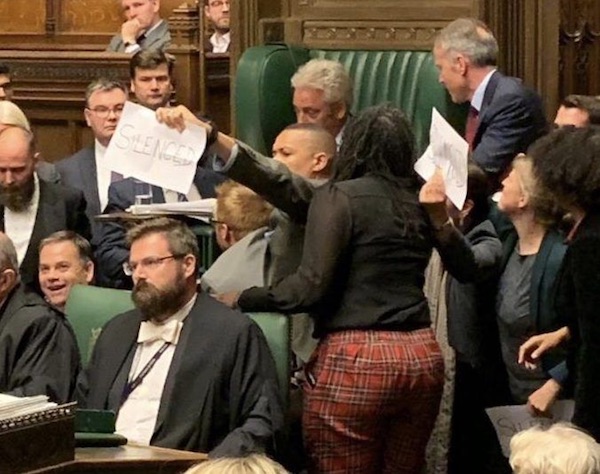
There were extraordinary scenes in the London parliament this week as opposition MPs staged an angry protest against the suspension of Westminster and accused the British Prime Minister of lying to the English queen in order to secure the Crown’s authority for the shutdown.
The bitter dispute about Brexit continues to wreak havoc within the British establishment. It is raising questions about Britain’s unwritten constitution as well as the nature of the union with Scotland and the North of Ireland.
Johnson stands accused of lying to his queen, Elizabeth Windsor, in order to secure the five-week suspension of Parliament. Scotland’s highest civil court ruled on Wednesday that the prorogation was unlawful because it was obtained for the “improper purpose of stymying Parliament”.
Johnson had claimed he had sought the suspension so that his new right-wing government could set out a legislative programme. But in a forceful judgement, the Court of Session in Edinburgh accepted that the real reason was in fact to stop Westminster holding his government to account over its Brexit plans. The ruling will be appealed at the Supreme Court in London on Tuesday.
A senior Conservative party MP, one of 21 who lost the whip last week, has said “it’s over for Boris Johnson” if the Supreme Court agrees that he intentionally misled the queen during the process.
Johnson did not help his case when he made clear he intends to ignore newly passed legislation requiring him to seek an extension to the Brexit deadline, declaring he would “rather be dead in a ditch” than obey the new law.
There are reports that the Scottish courts could now ‘go over the head’ of the rogue PM by acting itself, as a form of legal redress, to formally and legally request the EU to extend the Brexit deadline.
At the centre of scuffles inside the House of Commons, the Speaker of the House of Commons, John Berdow, openly declared the prorogation to be an abuse of power by the government.
As he began proceedings to shut down parliament, a group of opposition MPs displayed signs reading “SILENCED” and shouted in protest during a ritual that initiates the suspension.
Bercow expressed his anger, saying it was “not a normal prorogation”.
“It is not typical. It is not standard. It’s one of the longest for decades and it represents, not just in the minds of many colleagues, but huge numbers of people outside, an act of executive fiat,” he said.
In an incredible display in the early hours of Tuesday morning, MPs attempted to lie across the Speaker to prevent him leaving his seat. Bercow was due to leave the chamber as part of the formalities required for the suspension of parliament.
The move was likened to an intervention in 1629 when MPs sat on the Speaker in an attempt to prevent prorogation in a dispute over taxes imposed by then King Charles I.
One Labour MP threw himself across Bercow’s chair in protest and was violently pushed away by Commons staff. In the melee, the Green party leader, Caroline Lucas, was pushed over. Tory MPs still sitting in the chamber cackled and roared abuse at the Speaker and at the opposition.
Labour MPs, who remained in their seats after government MPs and the Speaker had left, sang the Red Flag, the SNP MPs sang the nationalist ‘Scots Wha Hae’ and Plaid Cymru MPs ‘Calon Lân’.
In another sign of a mounting dysfunction, the British government attempted a schoolboy fraud after it was found to have doctored official documents to downplay the risk of a no-deal Brexit. It had been forced by MPs to publish the its ‘Operation Yellowhammer’ documents on Brexit risks, which had previously been secretly sent to the Scottish government under the heading of a ‘base scenario’. Following a quick edit, London attempted to pass off the documents as a ‘worst case scenario’.
Even if Johnson and his cabal succeed in avoiding the law, their regime remains in a state of limbo. Without a majority, they have been unable to call an election, as opposition leaders continued to insist Johnson must first seek an extension of the Brexit deadline.
Scottish nationalist Westminster leader Ian Blackford said he was “desperate for an election”, but it could not take place until an extension was secured.
He said: “It’s not just about our own party interests, it’s about our collective national interests.” But he did anticipate that an election would be successfully called “over the course of these weeks”.
Commentators have said late November is now the most likely timeframe for an election.
Speaking after the parliamentary shutdown, Sinn Féin MP Chris Hazzard said Westminster had been paralysed for the last three years by the Tory/DUP pact.
“The self interests of the Tory elite have been prioritised above everything else,” he said.
“Westminster is the source of the problems of Brexit; it will not provide the solutions. The shelving of the British parliament will only add to the crisis caused by Brexit.
“That is why more and more people are now looking to a new future and considering their place in a new, united Ireland.”
![[Irish Republican News]](https://republican-news.org/graphics/title_gifs/rn.gif)
![[Irish Republican News]](https://republican-news.org/graphics/title_gifs/harp.gif)

